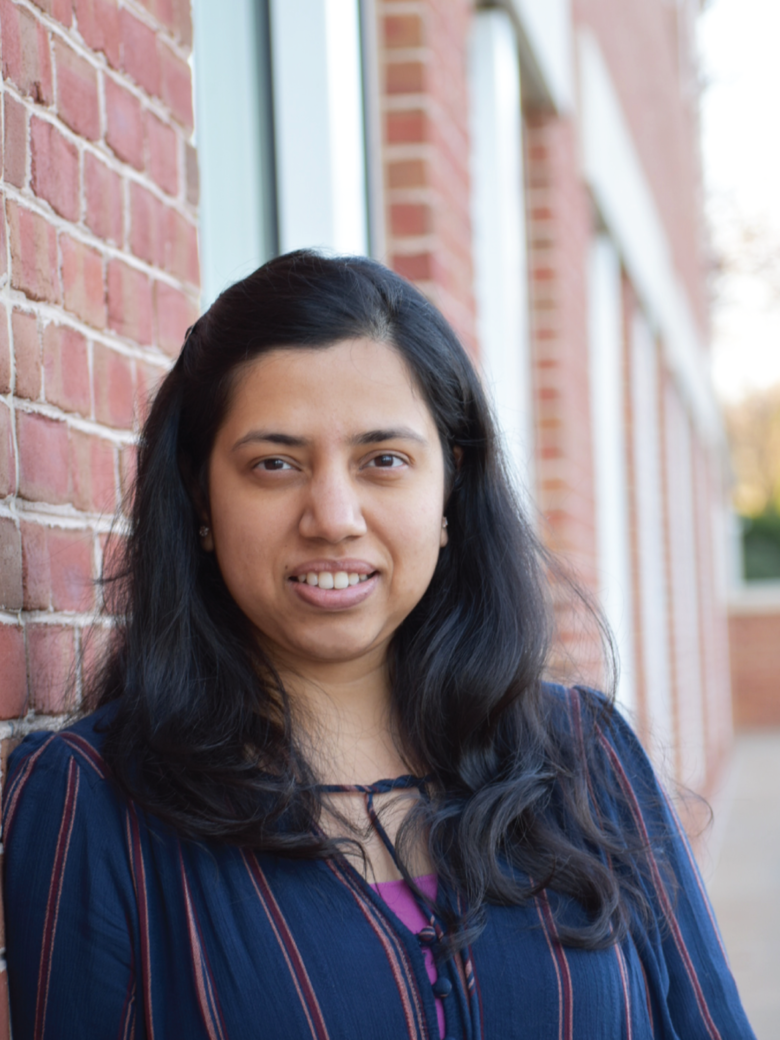
Biocomplexity Institute’s Swapna Thorve Named 2023 National Center for Women & Information Technology (NCWIT) Collegiate Award Winner
The UVA Biocomplexity Institute would like to congratulate Swapna Thorve, postdoctoral research associate in the Network Systems Science and Advanced Computing (NSSAC) Division, for being selected as the 2023 National Center for Women & Information Technology (NCWIT) Graduate Collegiate Award winner. The NCWIT Collegiate Award honors the outstanding computing accomplishments and technical contributions of undergraduate and graduate women, gender queer, or non-binary students that demonstrate a high level of innovation and potential impact. The NCWIT Award winners were announced at the 2023 NCWIT Summit on Women and IT on Thursday, May 18, in Denver, Colo.

Thorve was honored for her technical contributions to the Biocomplexity Institute's work examining the rapid evolution of the energy sector in the United States and the impact that climate change, extreme weather conditions, and emerging technologies such as electric vehicles and solar power are having on residential energy consumption and the power grid.
"The landscape of the energy sector is changing rapidly," said Thorve. "It's a primary infrastructure for our country, so we wanted to solve some of the social, technical, and sustainability problems that are arising. When you are a computer science or machine learning person, data is the key ingredient. We realized that there was a shortage of data in this domain, no channel to distribute data, and an issue with consumer privacy. So, we had to address these issues at the onset, which we were able to do with a digital twin."
A digital twin is a highly accurate synthetic replica of a population set existing anywhere in the world. It can include comprehensive population data ranging from basic demographic properties and household structure to activity schedules, locations people visit, and where they interact with others. While extremely detailed, the data is carefully culled to preserve individual privacy and protect sensitive data. Since the origination of digital twin technology during the COVID-19 pandemic, researchers across disciplines are rapidly adopting synthetic data to simulate "what if" scenarios in situations where there is an absence of real data or where maintaining privacy is integral.
Thorve played a pivotal role in developing a digital twin of residential energy usage for entire United States that was published in the February 2023 issue of Nature Scientific Data, the premier journal for open-access sharing of scientifically valuable datasets. With the issue of access to relevant data solved, Thorve and her team went back to the original challenge of solving emerging problems in the rapidly evolving energy sector.
"First, we looked at comparing solar adoption models – what factors are important for solar panel adoption in the household," Thorve continued. "Then, we looked at fair pricing for residential energy. We wanted to propose a pricing strategy that is fair and equitable to all communities. We developed several models based on income and a wide variety of appliance and energy usage schedules and scenarios, and found there was a small window where we could show that pricing was fair and equitable for everyone."
Samarth Swarup, research associate professor in the Institute’s NSSAC Division, has mentored Thorve throughout her time at the Biocomplexity Institute and on this work specifically. According to Swarup, Thorve's award-winning work consisted of three primary components: developing the extensive U.S. residential energy use data set; machine learning and agent-based simulations used in modeling to analyze various usage scenarios; and, demonstrating how both can be used in a real-world application to identify fair and equitable pricing.
"Swapna has tremendous attention to detail and has a real talent to put together an extremely detailed data set drawing from numerous data sources and then use that to very carefully model many different scenarios," said Swarup. "What she has done in developing a digital twin for modeling residential energy use has the potential to transform how we study energy use and better understand how to be more environmentally sensitive, how to reduce our carbon footprint, and how to incentivize people to have more green behaviors. Swapna has the keen ability to build computing systems and work with large and detailed datasets to build usable, integrated platforms. These are rare skills that are hard to find, so I think she has a really bright future ahead of her."
NCWIT is the farthest-reaching network of change leaders focused on advancing innovation by correcting underrepresentation in computing. Leveraging an ecosystem of programs and initiatives, NCWIT aims to increase the meaningful and influential participation of all girls and women – across race/ethnicity, class, age, gender identify, sexual orientation, disability status, and other historically marginalized identities – in computing from K-12 through career.
The 2023 NCWIT Collegiate Award honorees included 47 undergraduate and graduate students attending 38 post-secondary institutions in the United States with a major or minor in a computing or engineering discipline. The multi-tiered award structure includes one winner and honorable mention honorees in three categories including: freshmen, sophomores, and two-year college students; juniors and seniors; and graduate students. The NCWIT Collegiate Award winners receive a prize package that includes a $10,000 cash award. The full list of 2023 NCWIT Collegiate Award recipients is available here.
"It is incredible to feel recognized and that the work I have done is considered valuable and important in the scientific community," Thorve said. "That is definitely a great honor."
The UVA Biocomplexity Institute is committed to a culture of mentoring with the goal of shaping the next generation of outstanding scientists. From the most experienced Institute professors and laureates to thriving graduate students and exceptional high school scholars, the Institute aims to prepare the scientists of tomorrow to anticipate, recognize, and respond to some of society's most urgent and complex problems.
"The Biocomplexity Institute offers a unique experiential learning environment for students," said Dr. Madhav Marathe, NSSAC division director, Distinguished Professor in Biocomplexity, and computer science professor. "Swapna's work beautifully represents how students can learn and make outstanding contributions in this transdisciplinary team-science oriented environment. Although Samarth and I served as her primary doctoral advisors, Swapna was mentored by a number of other faculty members over the years, including Hannah Baek, Achla Marathe, Henning Mortveit, Anil Vullikanti, and Mandy Wilson, and worked in the lab alongside fellow graduate student Rounak Meyur. Her efforts built on decades of work that the Institute has done in this area. These interactions and collaborative efforts are important – done well they result in outstanding contributions. This has made Swapna's work stronger, deeper, and more widely applicable. Her work will be influential for years to come."